Venezuela
[Go to Spanish version]
Overview
SRI methods were introduced into Venezuela by the Inter-American Institute for Cooperation on Agriculture (IICA) in 2015. Diddier Moreira conducted the original training with the support of IICA, Fundarroz, Nestlé, INIA, and Fundación Danac. The event, which was held at Calabozo, Venezuela, introduced better rice growing practices, including SRI, to 40 rice growers. Due to continued interest from the rice-growers, there were follow-up workshops in 2016. The first was for another 18 people in Guárico and the second for 42 people in Araure, Portuguesa. In 2017, another training in Guárico for 21 people was held and a demonstration plot was created for an additional 68 people. Shortly after the training, Venezuela was represented by María Sandoval at the Second Regional Exchange: Advances with SRI in the Americas, which took place in Ibagué, Colombia, from October 10-12, 2017.
While SRI is still in its early stages in the country, IICA and those involved with SRI in Venezuela believe SRI has great potential for the country and are anxious to see it thrive. Since SRI methodology uses less seed and water, less agrochemicals, and leads to less pest problems, they believe it can be of great value for rice production in Venezuela. On February 15, 2019, IICA organized a webinar to bring together those working on SRI in Venezuela beginning in 2015. A webinar (April 17, 2019) focused on the SRI progress in Calabozo, Guárico, which has suffered greatly from drought over the past three years. A subsequent presentation on the Guárico results was made at December 12, 2019, at the Fundarroz y Fondesoya headquarters in Acarigua, Portuguese.
Progress and Activities
2020 Updates
 SRI Success Over Several Years by a Venezuelan Farmer
SRI Success Over Several Years by a Venezuelan Farmer
[August 13, 2020] An article on the Institute for Cooperation on Agriculture (IICA) website recounts the story of a Venezuelan rice farmer who successfully used SRI for several years to achieve greater resilience and sustainability in his rice crop. In 2017, Miguel Agüero became an SRI pioneer in Venezuela beginning by initially devoting a half-acre plot of land on his farm, No. 234 of the Río Guárico Irrigation System (SRRG), in the town of Calabozo. He now has almost three acres planted with SRI methods and has obtained a high-quality rice seed that lead to the creation of the family business, Semillas Banpedro C.A., to market it. The idea for the business came about as a result of the high quality of the rice seed produced. According to Agüero, his neighbors and those who are interested in seed quality saw the quality of the materials. He noted that "The plot of land has been for them one of the windows into SRI.”
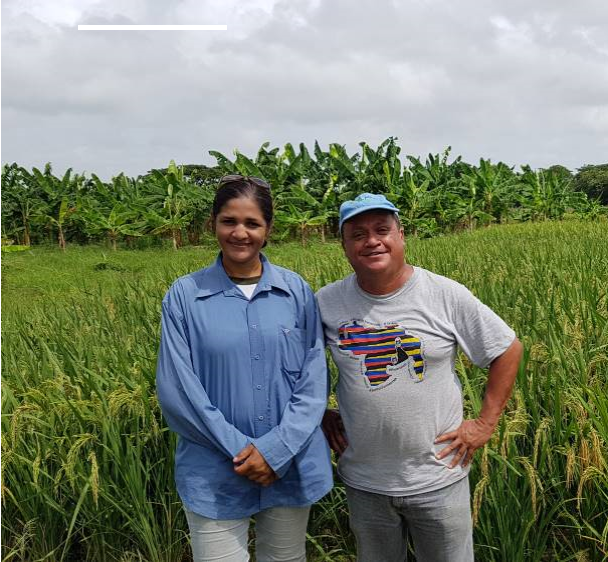 Given the difficult economic situation in Venezuela, one of the challenges to implementing SRI has been reduced availability and the cost of labor. Agüero, with assistance from researcher Betsaida Soublette (see photo at right), has had to make some adjustments and work towards improving the impact of the system.
Agüero relayed that “Labor is very expensive; we already have crews and we are trying to acquire planters and small shelling machines, but we have not been able to access them yet, although they are not expensive.”
During the planting process, a specific distance is created between the plants, but in the absence of a specialized machine, Agüero and Soublette came up with a novel idea. Normally, the sowing threads on the planter creates a 17cm distance: They added another thread to the planter and achieved a 34cm distance.
Other farmers in the area with vast expanses of land are also using this method of adjusting to their needs, which allows them to use less seeds and less plants per square meter.
Semillas Banpedro C.A., Miguel Agüero’s family business, has a small clientele, but it continues to grow.
“Taking the business forward has been extremely difficult. But if you are resilient during times of difficulty, you can lay a stronger foundation. That way, you’ll be ready to reap the fruit of your efforts once you’ve conquered the wave. A business can only flourish by overcoming adversities”, said Soublette, who elaborates additional SRI experiences in a short video produced by IICA. [See the IICA article for details.]
Given the difficult economic situation in Venezuela, one of the challenges to implementing SRI has been reduced availability and the cost of labor. Agüero, with assistance from researcher Betsaida Soublette (see photo at right), has had to make some adjustments and work towards improving the impact of the system.
Agüero relayed that “Labor is very expensive; we already have crews and we are trying to acquire planters and small shelling machines, but we have not been able to access them yet, although they are not expensive.”
During the planting process, a specific distance is created between the plants, but in the absence of a specialized machine, Agüero and Soublette came up with a novel idea. Normally, the sowing threads on the planter creates a 17cm distance: They added another thread to the planter and achieved a 34cm distance.
Other farmers in the area with vast expanses of land are also using this method of adjusting to their needs, which allows them to use less seeds and less plants per square meter.
Semillas Banpedro C.A., Miguel Agüero’s family business, has a small clientele, but it continues to grow.
“Taking the business forward has been extremely difficult. But if you are resilient during times of difficulty, you can lay a stronger foundation. That way, you’ll be ready to reap the fruit of your efforts once you’ve conquered the wave. A business can only flourish by overcoming adversities”, said Soublette, who elaborates additional SRI experiences in a short video produced by IICA. [See the IICA article for details.]
2019
 Presentation at Fundarroz y Fondesoya Headquarters Outlines Organic SRI Success
Presentation at Fundarroz y Fondesoya Headquarters Outlines Organic SRI Success
[December 17, 2019]. According to an article in Vision Agropecuaria, the combination of SRI/SICA (System of Rice Intensification) principles with the company TECNOAgua's own protocols resulted in a rice harvest in Calabozo, Guárico, of 10,580 kg / ha using only 10 kg / ha of seeds and zero chemical fertilizers. This was information was elaborated upon at a presentation on December 12 at the Fundarroz y Fondesoya headquarters in Acarigua, Portuguese. Given the climate change situation, another relevant benefit of SRI is the reduction of water consumption by 40 to 50%, as intermittent irrigation is used throughout the vegetative stage, which allows additionally promotes aeration of the soil. SRI principles are coupled with fundamental principles of the TECNOAgua Protocol, which include the treatment and incorporation of crop residues, the capture of atmospheric carbon, the use of biostimulants, foliar sprays, minerals, crushed rock, and both prebiotic and probiotic products. These practices reportedly nourish, reactivate and promote biological activity of the soil which are slowed by many of the current agronomic management practices. This reactivation allows a greater bioavailability of nutrients, a more cost-efficient use of them, improving and favoring the recovery of soils and the fertility lost from the first planting.
In Venezuela, SRI methods began to be validated with demonstration trials in 2017, through cooperative efforts of the Inter-American Institute for Cooperation on Agriculture (IICA), the National Institute for Agricultural Research (INIA), and the Nestlé company. Excellent results in the Río Guárico de Calabozo Irrigation System were recorded in plot 234 on the farm of Miguel Agüero's, a pioneer in SRI evaluation. The TECNOAgua company, which promotes recovery of degraded soils and the development of healthy crops with the integration of its own products and agronomic management in through its "TECNOAgua Protocol", was given the task of developing trials for the 2019 rainy season. The TECNOAgua Protocol was combined with the SRI/SICA methodology without the addition of inorganic fertilizers. The yield showed 10,580 kg/ha vs 7,872 kg/ha with the conventional SRI/SICA management system in which urea and NPK were used. This represents an important difference for the farmer who wishes to improve the productivity. In addition, the increased production is achieved with a small amount of seed, just 10 kg / ha vs the 100 or 120 kg that are used in conventional rice production. Also, better plant performance was observed, since by favoring development of individual plants, the number of tillers increases (30 vs 7 for conventional management.) And, since there is more space for the plant to express its potential, the roots deepen and become more abundant, allowing better uptake of nutrients from the soil. This explains how greater root weight and length is observed in the SRI/SICA method with 22.84 cm and 21.55 g respectively vs 1.86 g and 15.41 cm of conventional management, which in this case with conventional, high density sowing pre-germinated seed. At the end of January, a second presentation will show the final results comparing three types of sowing: the SICA / SRI, the
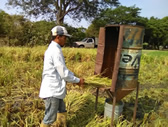 conventional transplanting of 30-day-old seedlings, and the pre-germinated broadcasting (SPGV). The experimental area is 12000 m2, where each treatment covers an area of 2,000 m2.
conventional transplanting of 30-day-old seedlings, and the pre-germinated broadcasting (SPGV). The experimental area is 12000 m2, where each treatment covers an area of 2,000 m2. SRI Experiences in Guárico Shared through Webinar and Photos
SRI Experiences in Guárico Shared through Webinar and Photos
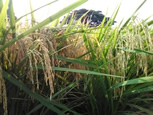 [April 23, 2019] In Venezuela, a 3-year drought affected a main rice area: Calabozo, in Guárico state. This, coupled with the shortage of seeds and other inputs, led to a sharp drop in production. To deal with this, the public and private sectors, with the technical leadership of IICA, tested the System of Rice Intensification (SRI) as a highly productive and profitable, agroecological and climate-smart farming system. Betsaida Soublette shared some of her SRI experiences in Calabozo, Guárico, Venezuela below. (These experiences are also described in an April 17 webinar sponsored by IICA and in an earlier PowerPoint presentation). The harvest of parcel 234, owned by Miguel Guerrero began on April 16. Overseen by Soublette, it was done by hand to ensure the purity of the basic seed to use in the next cycles. The Venezuelans are especially interested in SRI as it has been shown to produce high quality seed. The 1000 square meter parcel was planted with seed selected from the harvest during the prior rainy season.
[April 23, 2019] In Venezuela, a 3-year drought affected a main rice area: Calabozo, in Guárico state. This, coupled with the shortage of seeds and other inputs, led to a sharp drop in production. To deal with this, the public and private sectors, with the technical leadership of IICA, tested the System of Rice Intensification (SRI) as a highly productive and profitable, agroecological and climate-smart farming system. Betsaida Soublette shared some of her SRI experiences in Calabozo, Guárico, Venezuela below. (These experiences are also described in an April 17 webinar sponsored by IICA and in an earlier PowerPoint presentation). The harvest of parcel 234, owned by Miguel Guerrero began on April 16. Overseen by Soublette, it was done by hand to ensure the purity of the basic seed to use in the next cycles. The Venezuelans are especially interested in SRI as it has been shown to produce high quality seed. The 1000 square meter parcel was planted with seed selected from the harvest during the prior rainy season.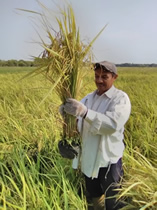 Given that the parcel was attacked by rodents during the vegetative phase, the harvester (at left) was pleasantly surprised by the number of tillers on the SRI plant, and the recovery of the parcel.
The photo at right shows the selection of plants with the seeds that will be
Given that the parcel was attacked by rodents during the vegetative phase, the harvester (at left) was pleasantly surprised by the number of tillers on the SRI plant, and the recovery of the parcel.
The photo at right shows the selection of plants with the seeds that will be 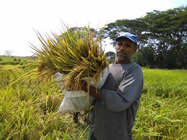 cultivated using SRI in the next cycle to produce basic seeds. Other producers in the area are seeing the impressive results and expressing lots of interest in using SRI for future production.
Producer leader and innovator Miguel Aguero is starting a small seed production business, called Semillas Banpedro, using SRI techniques. Great advances! [Photos courtesy of Betsaida Soublette.]
cultivated using SRI in the next cycle to produce basic seeds. Other producers in the area are seeing the impressive results and expressing lots of interest in using SRI for future production.
Producer leader and innovator Miguel Aguero is starting a small seed production business, called Semillas Banpedro, using SRI techniques. Great advances! [Photos courtesy of Betsaida Soublette.]
 Webinar on SRI Experiences in Venezuela
Held
Webinar on SRI Experiences in Venezuela
Held
On February 15, 2019, the Inter-American Institute for Cooperation on Agriculture (IICA) organized a webinar to bring together those working on SRI in Venezuela over the past several years (see program). The event was part of IICA's efforts to facilitate the integration of measures related to the adaptation and mitigation of climate change in agricultural production systems in Latin America and the Caribbean. National level strategic partners, including National Institute of Agricultural Research (INIA), Nestlé, and DANAC Foundation have established SRI trials in the states of Guárico and Portuguesa. Presentations were made by producers, advisors, and technicians who have been involved in evaluating the rice production activities. In addition to addresses by IICA staff, partner presentations by Betsaida Soublette (INIA), Miguel Aguero (a producer), and a Nestlé representative are available online.
2017
 The Second Regional Exchange: Advances with SRI in the Americas
The Second Regional Exchange: Advances with SRI in the Americas
[November 15, 2017] Venezuela participated in the Second Regional Exchange: Advances with SRI in the Americas, which took place in Ibagué, Colombia from October 10-12, 2017. During the meeting, participants from the countries of Colombia, Argentina, Costa Rica, Cuba, the Dominican Republic,
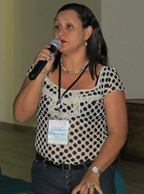 Ecuador, Nicaragua, Panamá, Trinidad-Tobago, and Venezuela presented the results of their experiences with SRI with the objective of exchanging information, lessons learned and opportunities for adapting SRI in the Americas. This Second Regional Exchange was organized by the Inter-American Institute for Cooperation on Agriculture (IICA) and the National Federation of Rice Growers of Colombia (FEDEARROZ), within the framework of the Project "Cultivate more with less: Adaptation, validation and promotion of the intensive system of rice cultivation (SRI) in the Americas as a response to climate change." The project was financed by FONTAGRO and the GEF. María Sandoval (at right) with the National Institute of Agricultural Research, presented on behalf of Venezuela. [See Venezuela poster presentation from the conference.]
Ecuador, Nicaragua, Panamá, Trinidad-Tobago, and Venezuela presented the results of their experiences with SRI with the objective of exchanging information, lessons learned and opportunities for adapting SRI in the Americas. This Second Regional Exchange was organized by the Inter-American Institute for Cooperation on Agriculture (IICA) and the National Federation of Rice Growers of Colombia (FEDEARROZ), within the framework of the Project "Cultivate more with less: Adaptation, validation and promotion of the intensive system of rice cultivation (SRI) in the Americas as a response to climate change." The project was financed by FONTAGRO and the GEF. María Sandoval (at right) with the National Institute of Agricultural Research, presented on behalf of Venezuela. [See Venezuela poster presentation from the conference.] SRI has Great Potential in Venezuela
SRI has Great Potential in Venezuela
[November 12, 2017] María Sandoval of the National Institute of Agricultural Research (INIA) of Venezuela, presented at the Second Regional Exchange: Advances with SRI in the Americas. She believes that SRI methodology has potential for the smallholder producer as it allows the efficient use of resources, mainly water, minimizes the application of herbicides due to mechanical control of weeds, and decreases the attack of pests and diseases. She also indicated that other institutions, including IICA, Fundación Danac and Nestlé have been supporting SRI efforts in Venezuela. Sandoval believes that the future of SRI for Venezuela should be oriented to the development of an inter-institutional research and monitoring project for data collection that validates the results of the SRI methodology and its benefits, thus increasing credibility on the part of producers and technicians. More demonstration plots should be developed with a greater number of producers, which allow to show, disseminate and validate the benefits of the SRI. Finally, it is important that more financial support be provided for the socialization of the methodology and its benefits for all the rice producing regions in Venezuela and that this contributes to its consolidation in the country. [See poster from the conference.]
 SRI Training Takes Place in Guárico
SRI Training Takes Place in Guárico
In 2017, a second SRI training (following on the 2015 training) took place in Guárico and was attended by 21 people. A field demonstration was completed with an additional 68 people. (See video for more information.)
2015-2016
 Several SRI Trainings Take Place in Guárico
and Portuguesa
Several SRI Trainings Take Place in Guárico
and Portuguesa
The introduction of SRI in Venezuela and its early success is due to Diddier Moreira’s efforts on training and equipping rice-growers throughout the region with the support of IICA, Fundarroz, Nestlé, INIA, and Fundación Danac. Diddier Moreira, a professional from IICA (Inter-American Institute for Cooperation on Agriculture) in Costa Rica first came to Calabozo, Guárico, in 2015 and presented on SRI at a workshop for better rice growing practices to 40 rice-growers. Due to increased interest from rice-growers, there was a follow-up workshop in 2016 for another 18 people in Guárico and a second workshop for 42 people at the Fundarroz headquarters in Araure, Portuguesa.
Reports and Articles
- 2020. Successful innovation attempt by a Venezuelan farmer to improve rice resilience. IICA website. August 13. [Account of an ongoing SRI project in Venezuela.]
- Soublette, Betsaida. 2019. Investigación en Venezuela: Como cosechar mas arroz con menos recursos. Vision Agropecuaria website. December 16.
- Witkowski, Kelly, and Diddier Moreira. 2017. Informe segundo intercambio regional: Avances cons SRI en las Américas [Read online (slideshare.net). Also, 15MB hi-res download version; or 5MB download version without posters]. SRI-Rice website. (50p., 4MB pdf) [Spanish language document about a regional workshop related to the Proyecto Cultivar más con menos: Adaptación, validación y promoción del Sistema Intensivo del Cultivo Arrocero (SRI) en las Américas como una respuesta al cambio climático. The workshop was held October 10-12 in Ibagué, Colombia.] [See also shorter description in English.]
- Gudiño, Blanca. 2016. Venezuela - Promueven metodología de producción arroz adaptada a los cambios climáticos. Ultima Hora website. July 14.
- Hurtado, Karlys. Fundarroz, IICA y Nestlé promueven sistema intensivo en cultivos de arroz. IICA Website. July 12, 2016.
Presentations
- 2019. El SRI, una respuesta a los desafíos de la producción arrocera. AgroEnlace - Transmisión en vivo (webinar). April 17. [Webinar organized by the Inter-American Institute for Cooperation on Agriculture (IICA). [In Venezuela, a 3-year drought affected a main rice area: Calabozo, in the Guárico state. This, coupled with the shortage of seeds and other inputs, led to a sharp drop in production. To deal with this, the public and private sectors, with the technical leadership of IICA, tested the System of Rice Intensification (SRI) as a highly productive and profitable, agroecological and climate-smart farming system.
- Aguero, Miguel. 2019. 1905 - SRI en Venezuela - Resena Historica de la Parcela 234. 24 slides. Presentation at the webinar Sistema Intensivo de Cultivo de Arroz (SRI) - Experiencia Venezuela, February 15. SRI-Rice slideshare channel. [Webinar organized by the Inter-American Institute for Cooperation on Agriculture (IICA)] accessed March 12, 2019]
- Nestlé. 2019. 1904 - SRI en Venezuela - Informe Resultados SICA Parcela 75 Norte Verano Calabozo 2018. 10 slides. Presentation on Nestlé SRI results at the webinar Sistema Intensivo de Cultivo de Arroz (SRI) - Experiencia Venezuela, February 15. SRI-Rice slideshare channel. [Webinar organized by the Inter-American Institute for Cooperation on Agriculture (IICA)] accessed March 12, 2019]
- Soublette, Betsaida. 2019. 1903 - Sistema Intensivo de Cultivo de Arroz (SRI) - Experiencia Venezuela. 25 slides. Presentation at the webinar Sistema Intensivo de Cultivo de Arroz (SRI) - Experiencia Venezuela, February 15. SRI-Rice slideshare channel. [organized by the Inter-American Institute for Cooperation on Agriculture (IICA)] accessed March 12, 2019]
- Sandoval, María. 2017 (November 9). Avances con SRI en las Américas - Venezuela. Poster presentation at the Segundo Intercambio Regional: Avances cons SRI en las Américas, bagué, Colombia, October 10-12, 2017.
- Cardona, Reinaldo. 2017. 1711 - Sistema Intensivo del Cultivo del Arroz para la Producción y Sustentabilidad del Rubro. Poster presentation, SRI-Rice channel, Slideshare [Spanish language presentation on 2017 results from SRI trials from parcel 234 in Calabozo, Guarico, Venenzuela.]
Videos
- 2020 (August 11). Betsaida Soublette, Experiencia SRI. Venezuela. IICA channel, Vimeo. [Spanish language video in which Betsaida Soublette, a rice researcher in Venezuela, describes her SRI trials she is conducting.]
- 2019 (July 29). Opiniónes de productores sobre SRI. 2:05 min. IICAnoticias channel, YouTube. [Farmer experiences with IICA-sponsored SRI efforts in Panama, Costa Rica and elsewhere in Latin America.]
- 2019 (July 29). 1) ¿Qué es SRI?. 2:00 min. SRI 2do Segmento. 6:10 min. SRI 3er Segmento 5:46 min. IICAnoticias channel, YouTube. [Agroconecxion TV show (in three parts) on IICA's SRI program.]
- 2015 (December 3). Entrevista Al Especialista de IICA Diddier Moreira. 7:22 min. Mercedes Fraile channel, YouTube. [Spanish language video interview with Diddier Moreira during an SRI/SICA workshop in Venezuela.]

